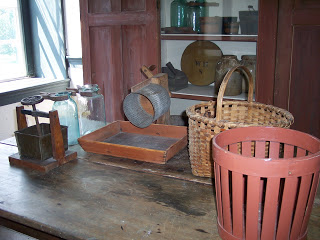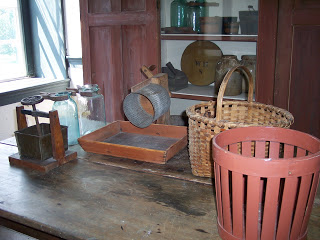 |
| Shaker Kitchen tools, etc |
“Do your work as if you had a thousand years to live, and as if you were to die tomorrow.” (Shaker Saying)
The Shakers believed in work. In fact they believed their work, whether it was making chairs, weaving cloth, peeling potatoes, tanning hides, or any of dozens of other tasks, was an act of worship. They considered that work and the faithful performance of their duties a way to show love and obedience to the Lord. The “laboring” of songs and dances in their worship services was how they kept their spirits inspired and their minds focused on the Shaker way.
So celebrating work and workmen would have been something the Shakers were ready to do everyday. We are celebrating laborers tomorrow. At least that was the initial reason for the Labor Day holiday. Now many consider it the last gasp of summer before cooler weather sets in and school starts in earnest. But the origin of the holiday is much more involved than that. I looked it up to include in our church bulletin today. I don’t know what I expected to find. Perhaps that, like Mother’s Day, some person had decided we needed to celebrate the hard workers in our country. But this holiday is different.
It originated during one of the most dismal periods in America’s labor history. In the late 1800s, workers had to work 12 hour days, 7 days a week in order to eke out even a meager living and often under the harshest work conditions. Children as young as 5 or 6 labored in mills, factories, and mines, earning a fraction of what their adult counterparts made.
On September 5, 1882, 10,000 workers took unpaid time off to march from City Hall to Union Square in New York City, holding the first Labor Day parade in U.S. history. The idea of a “workingmen’s holiday,” celebrated on the first Monday in September, caught on in other industrial centers across the country, and many states passed legislation recognizing it.
Congress would not legalize the holiday until 12 years later, when a watershed moment in American labor history brought workers’ rights squarely into the public’s view. On May 11, 1894, employees of the Pullman Palace Car Company in Chicago went on strike. The government sent in U.S. marshalls and the military and a number of the strikers were killed. President Grover Cleveland attempted to reconcile with the labor movement by making Labor Day an official federal holiday and the act was rushed through Congress and signed into law 6 days after the end of the Pullman strike.
I have always known Labor Day was for workers, but I never before dug into the history of how the day came to be. We sometimes think things have always been the way they are now or the way we remember them in our lifetime, but when you explore history your eyes can be opened to how much things have changed – and how much better things are for the common laborer in this day and time. We may be struggling with unemployment but none of us have to send our children out to work in factories in order to have food on the table. Our children go to school. Our workplaces are required to be safe. And tomorrow we’ll have a day off work to celebrate the working men and women in our country.
The Shakers would have understood that. They celebrated labor. But even more they believed in God dwelling within man and his work. One of their best known sayings was “Hands to work and hearts to God.”
Hope you have a wonderful Monday holiday and get a rest from your labors. Thanks for reading. I’ll leave you with one more Shaker saying.

